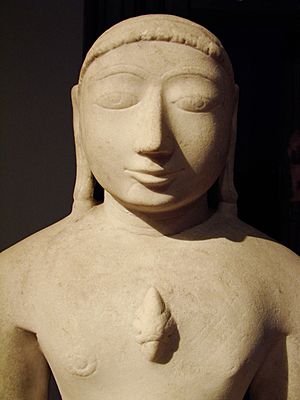Karma facts for kids

Karma (car-ma) is a word from ancient Sanskrit meaning the result of a person's actions as well as the actions themselves. It's a big idea that shows up in many different religions and philosophies, and it basically means that your actions have consequences. Think of it like a boomerang – what you throw out into the world, comes back to you.
But it's not just about simple cause and effect, like "if you hit someone, they'll hit you back." Karma is much more nuanced. It's about the energy you put out into the universe. Kind actions, helpful deeds, and positive thoughts create positive karma, which can lead to good things happening in your life. On the other hand, unkind actions, mean words, and negative thoughts create negative karma, which can lead to less positive experiences.
Contents
Understanding the nuances of karma
Karma isn't a simple equation of "good deed = good outcome." Several factors influence how karma plays out:
- Intention: Your intentions matter! If you accidentally hurt someone, the consequences might be less severe than if you intentionally hurt them. The energy behind your action is a key part of the karmic equation.
- Action: The action itself also matters, of course. A small act of kindness can still create positive karma, while a major act of unkindness will likely have more significant negative consequences.
- Consequences: The consequences of your actions can take many forms. They might be immediate, or they might play out over time. Sometimes, the consequences are obvious, while other times they're more subtle and might not be directly linked to your actions.
- Balance: The goal isn't to amass a huge amount of "good karma points." Rather, the idea is to strive for balance, to cultivate positive actions and minimize negative ones. This journey towards balance is a lifelong process of learning and growth.
Karma in everyday life
You don't need to be religious to understand the principles of karma. Thinking about the consequences of your actions can help you make better choices. Consider these examples:
- Helping a friend: If you help a friend who is struggling, you might feel good, and your friend will likely appreciate your support. This positive energy created can lead to positive experiences for you in the future.
- Being kind to strangers: A simple smile or act of kindness toward a stranger can brighten their day and yours. These small acts create ripples of positivity.
- Being honest: Telling the truth, even when it's difficult, builds trust and integrity. This honesty often leads to stronger relationships and a greater sense of personal well-being.
- Learning from mistakes: Everyone makes mistakes. The important thing is to learn from them and try to avoid repeating negative behaviors. This process of self-improvement is itself a form of positive karma in action.
Modern interpretations of karma
In today’s world, people often understand karma in different ways. Some people see it as a spiritual law of cause and effect, others — as a psychological principle that our actions shape our experiences and relationships. Regardless of interpretation, the underlying idea remains consistent: our actions have consequences, and striving to act in positive and constructive ways often leads to a more fulfilling life.
Activities to Learn About Karma
- Keep a kindness journal: Write down all the kind acts you do and the kind acts others do for you. Notice how good it feels to be kind and to receive kindness.
- Practice mindfulness: Pay attention to your thoughts and actions throughout the day. Notice how negative thoughts and actions can affect your mood and interactions with others.
- Read stories about karma: There are countless stories, from ancient fables to modern children's books, that illustrate the principles of karma in engaging and memorable ways.
Related pages
- Just-World Phenomenon is like Karma
Images for kids
-
Lotus symbolically represents karma in many Asian traditions. A blooming lotus flower is one of the few flowers that simultaneously carries seeds inside itself while it blooms. Seed is symbolically seen as cause, the flower effect. Lotus is also considered as a reminder that one can grow, share good karma and remain unstained even in muddy circumstances.
See also
 In Spanish: Karma para niños
In Spanish: Karma para niños







